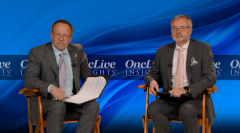
Chemotherapy Options for Endometrial Cancer
Bradley J. Monk, MD, FACS, FACOG, reviews the available chemotherapy options for treating advanced and recurrent endometrial cancer, as well as compares notes with Christian Marth, MD, PhD, on his clinical experience.
Episodes in this series

Transcript:
Christian Marth, MD, PhD: That’s important. But this way we have 76% of the patients with early diagnosis stage I. And this makes the prognosis for the majority of patients good, but still when we look at the pattern and the risk profile, we can find a lot of also high-risk patients, and they recur.
Bradley J. Monk, MD, FACS, FACOG: Yes.
Christian Marth, MD, PhD: We did, historically, hormone therapy and chemotherapy. What was your experience?
Bradley J. Monk, MD, FACS, FACOG: Yeah. Let’s talk about that. Initially, as you said, hormonal therapy was the first approved class of agents, megestrol [megestrol acetate], at least in the United States. And then as the cytotoxic intravenous chemotherapies came on board in 2004 it was a triplet-based on GOG [Gynecologic Oncology Group] 177. Basically, it was doxorubicin, cisplatin, and paclitaxel [Taxol] triplet [PDC] because that’s what the era was. We really didn’t like it. We thought that we could do just as well with carboplatin-paclitaxel. So the GOG did a noninferiority trial [of] that triplet cis [cisplatin], dox [doxorubicin], pac [paclitaxel] versus carboplatin-paclitaxel. That study known as GOG0209, which was reported by David Miller in 2012, and then published with mature overall survival in 2020, [and is] now confirmed the global standard of carboplatin- paclitaxel. We have shortages; did you have shortages of the Platinum Medicaid?
Christian Marth, MD, PhD: No.
Bradley J. Monk, MD, FACS, FACOG: OK. So we also reached something different. God bless your patients.
Christian Marth, MD, PhD: Yes.
Bradley J. Monk, MD, FACS, FACOG: Because we’re suffering right now. Oxaliplatin can be substituted, but we’re hopefully going to work through that with our FDA very, very soon. Ultimately, in the second line, again, we utilize the biomarkers that you described. So after failing first-line therapy, patients can be treated with dostarlimab [Jemperli], an anti-PD-1 [programmed death cell protein 1], or pembrolizumab [Keytruda], another anti-PD-1, if they’re MSI [microsatellite instability]-high or dMMR [deficient mismatch repair], just as you described. What percentage of patients have dMMR or MSI-high?
Christian Marth, MD, PhD: In the recurrent situation, approximately 25% to 30% of the patients have a mismatch repair deficiency.
Bradley J. Monk, MD, FACS, FACOG: If they’re not dMMR/MSI-high, then I think at least in my clinic we would use pembrolizumab in the anti-VEGF, TKI [tyrosine kinase inhibitor], pembro [pembrolizumab]/lenvatinib [Lenvima] based on KEYNOTE-775, or Study 309, [NCT03517449]. That’s an approved regimen in Europe as well?
Christian Marth, MD, PhD: Yes. We can use this.
Bradley J. Monk, MD, FACS, FACOG: Is it restricted to the biomarker or all-comers?
Christian Marth, MD, PhD: No. All-comers.
Bradley J. Monk, MD, FACS, FACOG: All comers. But you would not probably do it in dMMR.
Christian Marth, MD, PhD: That’s a huge discussion, obviously because of the toxicity, but we prefer for the mismatch repair deficient group the single agent IO [immuno-oncology] and for the mismatch repair proficient combination.
Bradley J. Monk, MD, FACS, FACOG: Again, agreement.
Christian Marth, MD, PhD: Agreement.
Bradley J. Monk, MD, FACS, FACOG: The long-term survival for 309, KEYNOTE-775, was just published in the Journal of Clinical Oncology on June 1st, 2023. And I refer you to that. The initial report was an interim analysis, but now after a much longer follow-up, the medians are more stable, and the long-term safety profile is clear. And it does confirm that that is the global standard, and that’s a great opportunity.
Transcript edited for clarity.






































